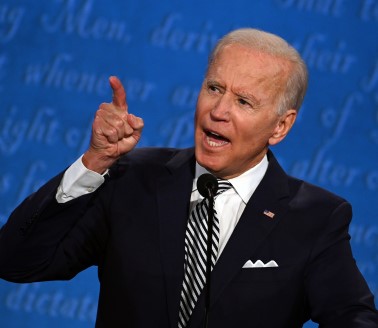Biden Restricts Drilling and Mining in Alaska Wilderness, Angering State Leaders
(Reuters) — The Biden administration on Friday took steps to limit both oil and gas drilling and mining in Alaska, angering state officials who said the restrictions will cost jobs and make the U.S. reliant on foreign resources, but pleasing environmentalists.
The measures are aligned with President Joe Biden's efforts to rein in oil and gas activities on public lands and conserve 30% of U.S. lands and waters to combat climate change.
The Interior Department finalized a regulation to block oil and gas development on 40% of Alaska's National Petroleum Preserve to protect habitats for polar bears, caribou and other wildlife and the way of life of indigenous communities.
The agency also said it would reject a proposal by a state agency to construct a 211-mile (340-km) road intended to enable mine development in the Ambler Mining District in north central Alaska.
The agency cited risks to caribou and fish populations that dozens of native communities rely on for subsistence.
"I am proud that my Administration is taking action to conserve more than 13 million acres in the Western Arctic and to honor the culture, history, and enduring wisdom of Alaska Natives who have lived on and stewarded these lands since time immemorial," Biden said in a statement.
The NPR-A, as it is known, is a 23 million-acre (93 million hectare) area on the state's North Slope that is the largest tract of undisturbed public land in the United States. The new rule would prohibit oil and gas leasing on 10.6 million acres (4.3 million hectares) while limiting development on more than 2 million additional acres (809,000 hectares).
The rule would not affect existing oil and gas operations, including ConocoPhillips' $8 billion Willow project, which the Biden administration approved last year.
Currently, oil and gas leases cover about 2.5 million acres (1 hectare).
The Ambler Access Project, proposed by the Alaska Industrial and Development Export Authority, would enable mine development in an area with copper, zinc and lead deposits and create jobs, the authority has said.
Interior's Bureau of Land Management released its environmental analysis of the project on Friday, recommending "no action" as its preferred alternative. The project now faces a final decision by the Interior Department.
Republican senators from Alaska and several other states held a press conference on Thursday to slam the administration's widely anticipated decisions.
"When you take off access to our resources, when you say you cannot drill, you cannot produce, you cannot explore, you cannot move it -- this is the energy insecurity that we're talking about," Senator Lisa Murkowski said. "We're still going to need the germanium, the gallium, the copper. We're still going to need the oil. But we're just not going to get it from Alaska."
Environmentalists, an important part of Biden's base ahead of the Nov. 5 U.S. elections, praised the moves for protecting habitats and cultural resources at a time of change in the region.
"As the Arctic undergoes dramatic climatic changes, this new rule (on NPR-A) is absolutely necessary to protect birds, caribou, and fish,” said David Krause, interim executive director at Audubon Alaska.
Related News
Related News

- Enbridge Plans 86-Mile Pipeline Expansion, Bringing 850 Workers to Northern B.C.
- Intensity, Rainbow Energy to Build 344-Mile Gas Pipeline Across North Dakota
- U.S. Moves to Block Enterprise Products’ Exports to China Over Security Risk
- 208-Mile Mississippi-to-Alabama Gas Pipeline Moves Into FERC Review
- Strike Pioneers First-of-Its-Kind Pipe-in-Pipe Installation on Gulf Coast with Enbridge
- U.S. Pipeline Expansion to Add 99 Bcf/d, Mostly for LNG Export, Report Finds
- A Systematic Approach To Ensuring Pipeline Integrity
- 275-Mile Texas-to-Oklahoma Gas Pipeline Enters Open Season
- LNG Canada Start-Up Fails to Lift Gas Prices Amid Supply Glut
- Kinder Morgan Gas Volumes Climb as Power, LNG Demand Boost Pipeline Business





Comments